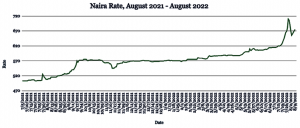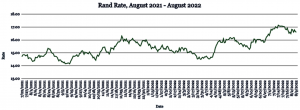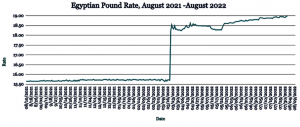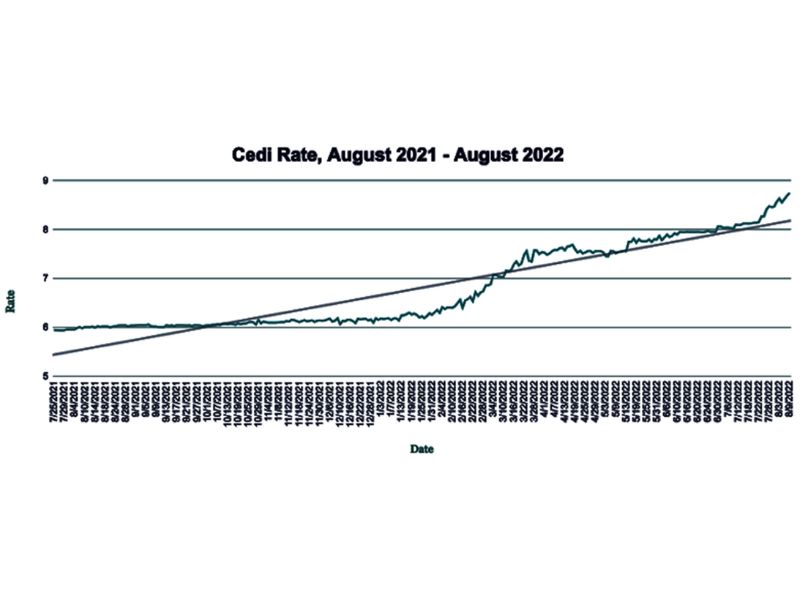The Cedi lost further ground against the dollar this week, slipping to a fresh record low of 8.80, from 8.65 at last week’s close.
Ghana’s hefty foreign currency debt stock has led to increased FX demand for repayments, with global economists predicting further depreciation for the Cedi. Fitch Ratings this week cut the country’s credit rating further into junk territory, lowering it two levels to CCC, eight below investment grade.
The rating agency said high interest costs coupled with low revenue as a percentage of GDP means any potential IMF deal is likely to include demands for “some form of debt treatment.” Against this backdrop, we expect the Cedi to continue decline as far as 10 to the dollar in the near term.

No election relief in sight for Kenya’s record low Shilling
As Kenyans headed to the polls this week, the Shilling slumped to a fresh record low against the dollar, trading at 119.15/119.35 from 118.90/119 at last week’s close.
After a tight contest between William Ruto and RailaOdinga, most investors are awaiting the results, expected early next week, before taking a longer view on the country’s economic prospects.
While each candidate has pledged support to spur economic recovery with support for the poorest Kenyans, both face the same challenge: rising debt levels. Debt to GDP stood at 68.4% last year, up from 65.6% in 2020.
Foreign exchange reserves are thinning, with import cover falling this week to a six-year low of $7.72bn, from $7.74bn a week earlier, enough to cover 4.45 months of imports. Continued support for current food and fuel subsidies looks challenging in this environment.
While foreign investors may be buoyed by a relatively peaceful election, we expect the Shilling to remain under pressure regardless of who takes the presidency. For the near term, we see increased dollar demand and lower FX inflows from export-earning sectors.

Naira set for 700 levels as food prices soar
The Naira declined against the dollar this week, trading at 675 from 665 at last week’s close as dollar demand increased on the unofficial market amid accelerating food inflation.
The Premium Breadmakers Association of Nigeria warned of another potential price hike due to the high cost of wheat and other baking materials. That comes less than a month after bakers went on strike over cost pressures, resulting in a 15% rise in bread prices.
Among the possible solutions being proposed by the association is for the government to create another forex window for wheat imports. We expect the Naira to continue sliding towards the 700 level as pent-up dollar demand creates further pressures on the parallel market.

Rand reprieve from below-expectations US inflation
The Rand appreciated marginally against the dollar this week, trading at 16.61 from 16.76 at last week’s close after US inflation data came in below market expectations, potentially reducing the odds of a 75 basis point hike at the next Federal Reserve meeting.
On the domestic front, investors are watching the outcome of a motion to impeach President Cyril Ramaphosa for failing to properly disclose details about an alleged theft of $4m that was hidden at the president’s farm. While his impeachment is not expected, any signs that Ramaphosa’s job is unsecure could increase Rand volatility.
Absent that development, we expect the currency to continue trading around this level in the near term.

Egypt plans electricity cuts to save FX
The Pound weakened marginally against the dollar this week, trading at 19.14, the lowest since 2016, from 19.13 last week. Egypt’s government said this week it will start to cut back on electricity use in order to redirect more natural gas towards exports to boost FX inflows.
The government hopes to redirect about 15% of gas that is currently consumed domestically, with the extra foreign currency generated potentially helping to ease pressure from rising import costs on items such as food. Electricity bills have risen by as much as 30% as soaring temperatures prompt households to keep air-conditioning and fans on for longer.
We expect the Pound to continue declining in the week ahead towards 19.20 levels.

Uganda inflation pressure weighs on Shilling
The Shilling strengthened against the dollar this week, trading at 3855/3865 from 3875/3885 at last week’s close.
The Ugandan Finance Ministry said it is considering making changes to future borrowing plans due to mounting debt repayment pressures. The ministry will focus on concessional loans and the domestic debt market for budget financing.
Meantime, higher global food and energy prices continue to accelerate inflation, dampening the outlook for the Shilling.
Increased dollar demand from oil importers is also likely to weaken Uganda’s currency against the greenback in the coming days.

Shilling steady as Bank of Tanzania eases liquidity expansion
The Shilling was unchanged against the dollar again this week, trading at 2327/2337, in line with last week’s close.
The Bank of Tanzania said it will ease the pace of liquidity expansion for the remainder of the year as it seeks to get a grip on rising inflation levels, which the country’s National Bureau of Statistics said hit 4.4% in June—the fastest annual increase since November 2017.
The bank also said that FX reserves were $5.1bn at the end of June, adequate for 4.6 months of import cover. Against this backdrop, we see little change for the Shilling in the near term.
Credit: www.azafinance.com









